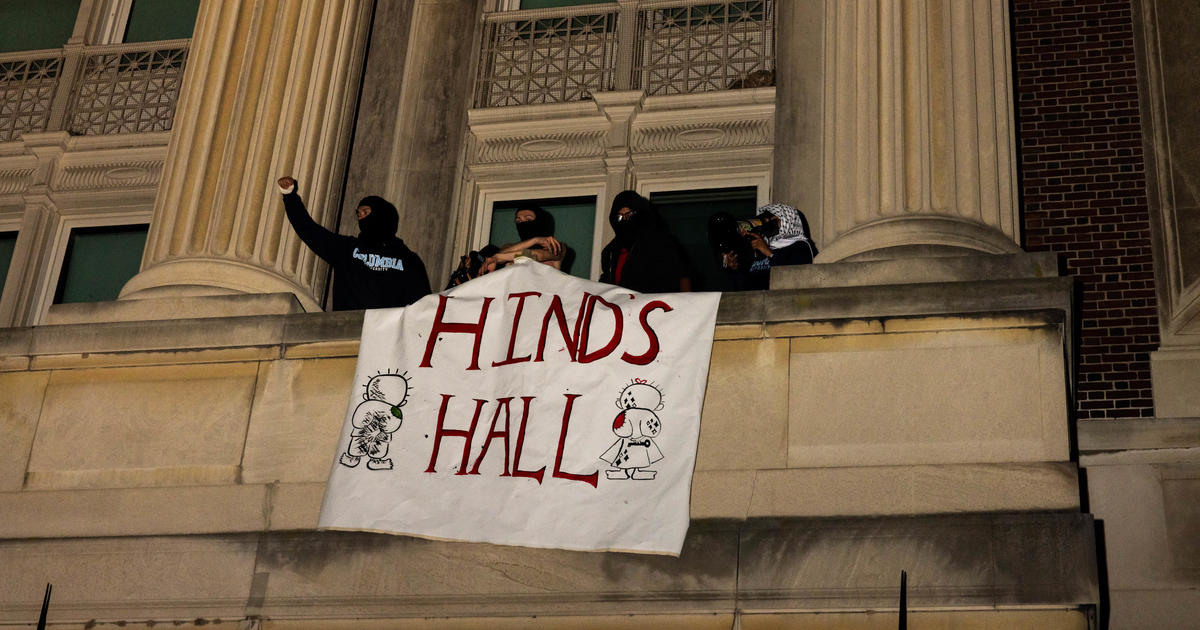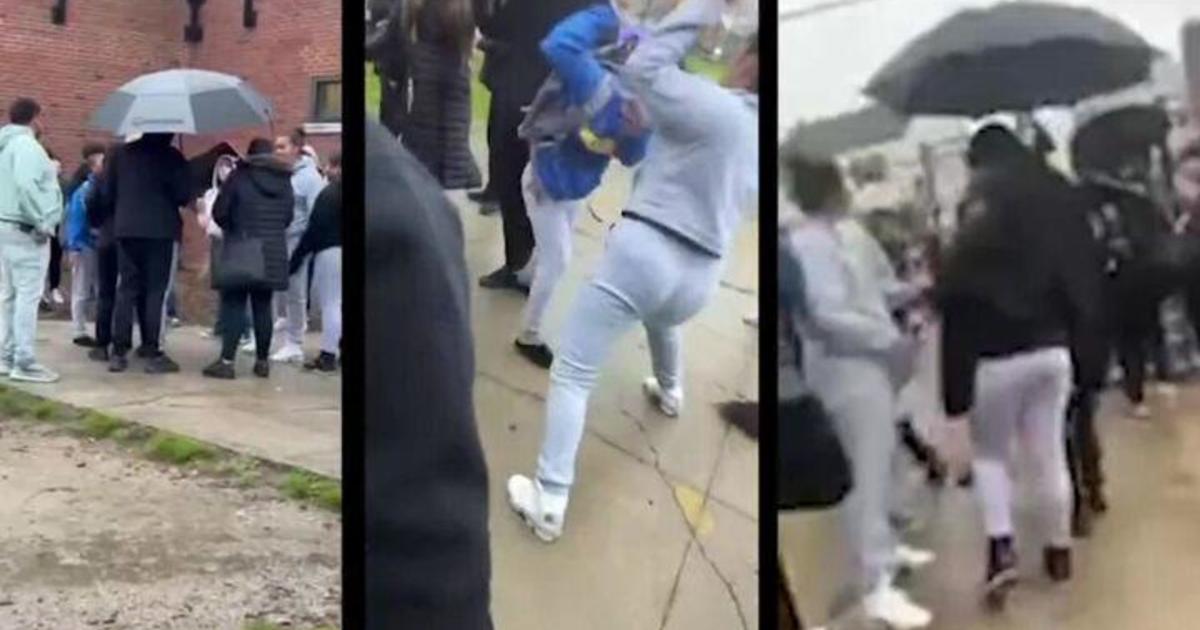Accounting Firm Apologizes For Series Of Gaffes In Erroneous Best Picture Announcement
LOS ANGELES (CBSNewYork/AP) -- The accounting firm responsible for the integrity of the Academy Awards said Monday that its staffers did not move quickly enough to correct the mistaken announcement of the best picture winner.
PwC, formerly PricewaterhouseCoopers, wrote in a statement that several mistakes were made and two of its partners assigned to the prestigious awards show did not act quickly enough when "La La Land" was mistakenly announced as the best picture winner. Three of the film's producers spoke before the actual winner, the coming-of-age drama "Moonlight," was announced.
"PwC takes full responsibility for the series of mistakes and breaches of established protocols during last night's Oscars," PwC wrote. It said its partner, Brian Cullinan, mistakenly handed presenters Warren Beatty and Faye Dunaway an envelope containing the winner of the best actress award.
"Once the error occurred, protocols for correcting it were not followed through quickly enough by Mr. Cullinan or his partner," the statement read.
It did not address in detail which protocols were violated, or say whether a tweet Cullinan sent about best actress winner Emma Stone before the best picture announcement contributed to the mistake.
The firm, which has handled Oscar winner announcements for eight decades, apologized to Beatty, Dunaway, the cast and crew of "La La Land" and "Moonlight," and host Jimmy Kimmel.
"We wish to extend our deepest gratitude to each of them for the graciousness they displayed during such a difficult moment," the statement said. "For the past 83 years, the Academy has entrusted PwC with the integrity of the awards process during the ceremony, and last night we failed the Academy."
The statement came after nearly a day of speculation about how the worst gaffe in Oscars history unfolded. The fiasco launched countless punchlines, memes and a probe of what went wrong.
The coming-of-age drama "Moonlight'' won the Academy Award for best picture after the ceremony was plunged into chaos when "La La Land'' was mistakenly announced as the best picture winner.
Shock spread through the Dolby Theatre when producers of "La La Land" were stopped in the middle of their acceptance speeches. "La La Land'' producer Jordan Horowitz returned to the microphone and said it was "Moonlight'' that had actually won best picture.
EXTRAS: Full List Of Academy Award Winners | Photos: 89th Annual Academy Awards
"This is not a joke," Horowitz insisted and even held up the card showing that "Moonlight'' was the true winner.
Host Jimmy Kimmel came forward to inform the cast that "Moonlight" had indeed won. Horwitz then graciously passed his statue to the "Moonlight" producers.
Apparently, presenter Warren Beatty had been handed the wrong envelope. Instead of best picture, he had been given a duplicate envelope for best actress in a leading role.
Beatty said he paused so long before the name was read because the envelope said Emma Stone, "La La Land.'' Actress Faye Dunaway read the name "La La Land'' after chiding Beatty for taking so long to read the winner.
"I wasn't trying to be funny," Beatty said.
Later, the accounting firm in charge of handing out the envelopes, PricewaterhouseCoopers, issued a statement:
"We sincerely apologize to 'Moonlight,' 'La La Land,' Warren Beatty, Faye Dunaway, and Oscar viewers for the error that was made during the award announcement for Best Picture. The presenters had mistakenly been given the wrong category envelope and when discovered, was immediately corrected. We are currently investigating how this could have happened, and deeply regret that this occurred. We appreciate the grace with which the nominees, the Academy, ABC, and Jimmy Kimmel handled the situation."
Backstage, Stone, who took home the award for best actress in a leading role, was gracious about the mix-up but said she was holding her winning envelope at the time.
"I think everyone's in a state of confusion still," said Stone. "I think we all would have loved to win best picture, but we are so excited for 'Moonlight.'"
"La La Land" still won six awards, including honors for cinematography, production design, score, the song "City of Stars" and best director Damien Chazelle. The 32-year-old filmmaker became the youngest to win best director.
"This was a movie about love and I was luckily enough to fall in love while making it," said Chazelle, speaking about his girlfriend and Oscars date, Olivia Hamilton.
Before the mix-up, the 89th Annual Academy Awards seesawed between jabs at Donald Trump and passionate arguments for inclusivity.
Casey Affleck's portrayal of a grieving father in "Manchester by the Sea" won him the best actor Academy Award.
It was Affleck's first Oscar. He is the younger brother of Ben Affleck and took the "Manchester" part after Matt Damon had to drop the role.
Though many expected the awards to be one long parade for "La La Land," it didn't play out that way. Awards were spread around to "Moonlight," "Manchester by the Sea" and "Hacksaw Ridge," among others.
Barry Jenkins and Tarell Alvin McCraney won for adapted screenplay.
"All you people out there who feel like there isn't a mirror out there for you, the academy has your back, the ACLU has your back and for the next four years we will not leave you alone, we will not forget you," said Jenkins.
Kenneth Lonergan, the New York playwright whose last film ("Margaret") was beset by lawsuits and conflict, won best original screenplay.
"I love the movies. I love being part of the movies," said Lonergan, who then thanked his star. "Thank you Casey Affleck, Casey Affleck, Casey Affleck."
The show kicked off with Justin Timberlake dancing down the Dolby Theatre aisles, singing his ebullient song, "Can't Stop the Feeling," from the animated film "Trolls."
It was an early cue that the Oscars would steer, at least in part, toward festiveness rather than heavy-handedness. Protests, boycotts and rallies have swirled ahead of Sunday night's Oscars. But host Kimmel, in his opening monologue, quickly acknowledged that he "was not that guy" to heal a divided America.
But he still, pointedly, led a standing ovation for the "overrated" Meryl Streep. He later tweaked the president by tweeting to him on air, including telling him that Streep "says hi."
Viola Davis won the supporting actress Academy Award for her role in "Fences.'' Davis won for her portrayal of a mother determined to hold her family together despite the rages of her husband, who is played by best actor nominee Denzel Washington.
The wins for Davis and Mahershala Ali, the "Moonlight" co-star, were both widely expected. Their awards marked the first time in more than a decade that multiple Oscar acting honors went to black actors.
"I became an artist, and thank god I did, because we are the only profession to celebrate what it means to live a life," said Davis. "So here's to August Wilson, who exhumed and exalted the ordinary people."
Ali won best supporting actor for "Moonlight." He glowed on the stage as he informed the crowd that he and his wife, Amatus Sami-Karim, welcomed a daughter four days earlier. The actor thanked his wife for "being such a soldier through the process."
Both stuck to more private reflections over politics. But a more blunt protest came from a winner not in attendance. Best foreign film for the second time went to Asghar Farhadi, director of Iran's "A Salesman."
Farhadi, who also won for his "A Separation," had said he wouldn't attend because of Trump's travel band to seven predominantly Muslim nations. Anousheh Ansari, an Iranian astronaut, read a statement from Farhadi.
"I'm sorry I'm not with you tonight," it read. "My absence is out of respect for the people of my country and those of other six nations who have been disrespected by the inhumane law that bans entry of immigrants to the U.S."
The broadcast often veered between such strong personal statements and Kimmel's efforts to keep things a little lighter with bits reminiscent of his late-night show. Shortly before he led a dazed, unsuspecting tour group into the theater, presenter Gael Garcia Bernal, the Mexican actor, declared: "As a migrant worker, as a Mexican, and as a human being, I am against any wall." Rich Moore, one of the three directors of Disney's best animated film winner "Zootopia," described the movie as about "tolerance being more powerful than fear of the other."
Gibson's World War II drama "Hacksaw Ridge" was, surprisingly, the evening's first double winner, taking awards for editing and sound mixing. The bearded Gibson, for a decade a pariah in Hollywood, was seated front and center for the show, and was a frequent presence throughout.
Ezra Edelman's "O.J.: Made in America" took best documentary, making it -- at 467 minutes -- the longest Oscar winner ever, beating out the 1969 Best Foreign Language Film winner "War and Peace" (431 minutes). Edelman's documentary, while it received an Oscar-qualifying theatrical release, was seen by most on ESPN as a serial, prompting some to claim its place was at the Emmys, not the Oscars.
Edelman dedicated the award to the victims of the famous crime, Nicole Brown Simpson and Ronald Goldman.
"This is also for other victims, victims of police violence, police brutality," Edelman said. "This is their story as it is Ron and Nicole's."
The #OscarsSoWhite crisis of the last two years was largely quelled this season by a richly diverse slate of nominees, thanks to films like "Moonlight," "Fences" and "Hidden Figures." A record six black actors are nominated. For the first time ever, a person of color is nominated in each acting category. And four of the five best documentary nominees were also directed by black filmmakers.
"I want to say thank you to President Trump," Kimmel said in the opening. "Remember last year when it seemed like the Oscars were racist?"
The nominees follow the efforts by Academy of Motions Pictures Arts and Sciences President Cheryl Boone Isaacs to diversify the membership of the largely white, older and male film academy. In June, the academy added 683 new members: 46 percent of them were female; 41-percent were nonwhite; and they pulled from 59 countries.
"Tonight is proof that art has no borders, no single language and does not belong to a single faith," said Isaacs.
(© Copyright 2017 CBS Broadcasting Inc. All Rights Reserved. The Associated Press contributed to this report.)



